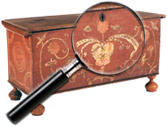The Schlegelmilch Porcelain Works
Fine molded porcelain with transfer or hand-painted decoration was manufactured from the early 1860′s until the advent of World War I by two independent families sharing the name Schlegelmilch in the Germanic state of Prussia and Silesia. (Prussia was later incorporated into East Germany and is now a part of modern Germany; Silesia was then considered to be German Poland).
R.S. Prussia
The most well known and widely collected of these wares is R.S. Prussia, manufactured by Reinhold Schlegelmilch (1837 to 1906) in Suhl, Germany and Tillowitz, Poland. (World War I caused the family to consolidate their operations in Tillowitz.) The vast number of mold shapes and wide variety of decorative themes used by this factory give R.S. Prussia a strong appeal in the collecting community. In general, R.S. Prussia’s decorative themes can be categorized as figural (usually based on a famous artist’s work), birds, florals, portraits, scenics, and animals.
The Reinhold Schlegelmilch works produced both decorated and blank wares using several different underglaze marks. The R.S. Prussia mark was used on products of the family’s Suhl works (established in 1869) from the 1870′s until 1917. Their Tillowitz factory (opened in 1894) used the R.S. Germany mark from about 1914 until 1945. Some porcelain wares produced there from the 1920′s to the 1940′s were marked R.S. Tillowitz or R.S. Silesia. At the end of WWII the firm was confiscated by Poland’s new Communist government which continued to operate the factory. From 1946 to 1956 they marked wares R.S. Poland; after 1956 the PT Poland mark was used.
Another mark used exclusively by the Reinhold Schlegelmilch operation was Royal Vienna Germany. The mark, which also features a crown, was used from 1902 to 1905 and was applied in red enamel and fired into the glaze. For a few years after 1905 the mark in bright gold was used, but the “Germany” was removed. In many cases, this mark appears in concert with the red/green
Prussian Wreath and Star.
R.S.Suhl
The “other” Schlegelmilch family, the Erdmann Schlegelmilch family also made porcelain in Suhl. Their “porzellanfabrik” was founded by Leonard Schlegelmilch (1823 to 1898) and named in honor of his father Erdmann Schlegelmilch (1782 to 1844). Operated from 1861 to 1937, this factory marked its wares R.S. Suhl from 1900 until about 1917.
Leonard’s son Carl (1855 to 1920) operated another porcelain works in Mabendorf from 1883 to 1918 as a branch of the Suhl operation.
Another son, Oscar Schlegelmilch (1862 to 1938), established a somewhat more independant porcelain factory in Langewiesen where it operated from 1892 until 1945 when the firm was seized by the East German government. Oscar created the only known link to the more “famous” Schlegelmilch family when he married Reinhold’s daughter Bertha (1870 to 1930).
Poland China
Fine R.S. Prussia-type porcelains marked with the “RS” wreath having a “Poland China” halo presented somewhat of a mystery to collectors for many years. Recently R.S. Prussia scholar and author R.H. Capers has unraveled their history with the help of several other collectors. It now appears that these were genuine R.S. Prussia pieces imported into the Chicago, Illinois region in the period just prior to World War I. There an unknown entity re-marked the wares overglaze with a RS wreath and “Poland China” mark in order to make them saleable during the anti-German war fever, thus pieces so marked can be dated to the 1912/1914 era.
